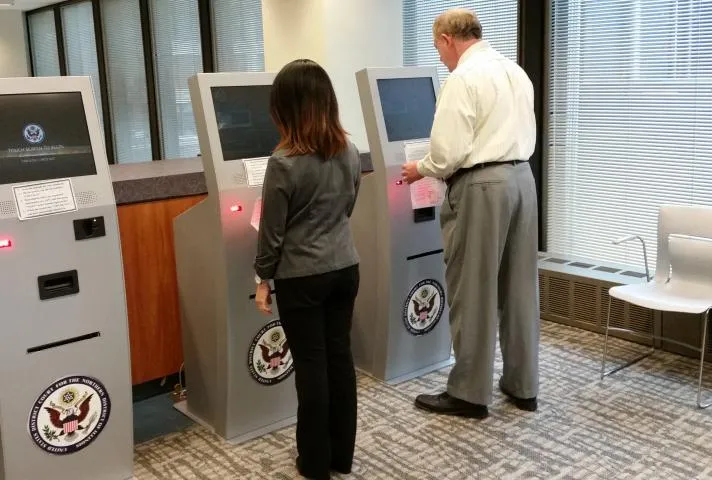The Judiciary is committed to innovative court management and administration that effectively addresses the changing needs of the bar, judges and court staff, and the public.
Next Generation Case Management
Although challenges remain, the Judiciary made progress on a major, multi-year effort to migrate courts to the Next Generation CM/ECF, the Judiciary’s upgraded Case Management/Electronic Case Files System. The system allows Judiciary personnel and public users to provide a single login and password across courts and enables court staff to consolidate different views of case data in a single interface. By the end of the year, eight of 13 courts of appeals had made the transition, and 22 district and bankruptcy courts were either up and running or in the process of implementation. Courts that are transitioning are aided by an Administrative Office of the U.S. Courts (AO) implementation team and court staff mentors who have already been through the process.
For courts of appeals, the new system improves the attorney filer interface and allows judges and staff attorneys to download and store pending matters and supporting documents on tablets. District and bankruptcy judges and chambers staff can automatically gather materials relevant to pending motions or other matters.
Supporting PROMESA Case Work
The AO provided support to the judges and courts handling the petitions for relief filed by the Commonwealth of Puerto Rico under the Puerto Rico Oversight, Management, and Economic Stability Act (PROMESA). The act makes certain sections of the U.S. Bankruptcy Code applicable to the commonwealth and addresses Puerto Rico’s debt by establishing an oversight board, a process for restructuring debt, and expedited procedures for approving critical infrastructure projects. The AO also provided legal and policy guidance on case-related issues such as the use of interpreters and the appointment of judge-mediators and magistrate judges. Although the cases filed under PROMESA were pending in the U.S. District Court for Puerto Rico, the bankruptcy version of CM/ECF was being used to manage the dockets. The AO provided technical assistance for this special use.
Making Jury Service More Efficient
Several software and technology upgrades that will improve jurors’ interactive experience with the courts were tested in 2017. The changes make obtaining complete and accurate information from prospective jurors more efficient and enable jurors to easily complete juror questionnaires on smartphones or tablets and link to a court’s eJuror website. The layout of eJuror automatically adjusts to the dimensions and orientation of a user’s device. An upgraded version of the Jury Management System software will give courts access to an improved juror qualification questionnaire adopted by the Judicial Conference.
Juror Kiosks
In 2017, the AO continued a pilot program to test juror kiosks in 14 district courts representing a variety of court sizes and juror practices. Kiosks typically are located in jury assembly rooms and allow prospective jurors to check in quickly by scanning their summons letters. The kiosks also prompt them to answer questions left incomplete in the questionnaires. Information entered into the kiosk is uploaded automatically into the Jury Management System, helping to keep contact information up-to-date and ensuring that notifications via eJuror and the automated messaging system are sent to the correct email addresses and phone numbers. Most of the juror kiosk software’s features can be customized to meet an individual court’s needs. Once the pilot project is completed, kiosks will be made available to all courts that wish to have them.

Jury Clerk Jessica Gomez and Jury Administrator Daniel Fitzsimmons, of the Northern District of Illinois, demonstrate the check-in process on new jury kiosks being deployed in the federal courts.
Improving Access to Spanish Interpreters
The Federal Court Interpreter Certification Examination was administered in September and October 2017 to identify and certify new Spanish interpreters. Successful candidates will be added to the National Court Interpreter Database and be available to federal courts nationwide. The AO also held a three-day workshop for court personnel who obtain the services of interpreters in their courts, covering topics such as procuring and managing services.
In fiscal year 2017, U.S. district courts used interpreters in 239,912 court proceedings, compared with 265,888 proceedings in the prior fiscal year. Overall, 130 different languages were used in court proceedings during 2017. Spanish remains the most frequently used language for interpreters in the courts, accounting for 96 percent of reported interpreting events. The top 10 languages that required interpreting were Spanish (230,036), Mandarin (1,211), Russian (883), Portuguese (864), Arabic (754), Korean (347), Mixteco (302), Haitian Creole (269), Foochow (251), and Vietnamese (233).
Protecting Sensitive Data in Social Security and Immigration Cases
The Judiciary is taking action to further protect personal information contained in court opinions in Social Security and immigration cases. The Judiciary has already taken steps to limit access to court-held information in such cases — for instance, preventing non-party, remote electronic access to case documents. The written opinions for these cases, however, have been unrestricted. In 2017, the Judicial Conference’s Committee on Court Administration and Case Management proposed that courts consider using only a party’s first name and last initial in these opinions rather than full names, masking identities and reducing misuse of sensitive data. The issue was referred to the Committee on Rules of Practice and Procedure. Some courts may adopt local rules to make the change immediately; some may wait until the issue is considered by the Rules Committee.
Annual Report 2017
- Annual Report 2017
- Funding/Budget
- The Courts and Congress
- The Federal Bench in 2017
- Accountability and Resource Management
- Facilities and Security
- Public Outreach
- Court Operations and Case Management
- Defender Services
- Probation and Pretrial Services
- Human Resources
- Information Systems and Cybersecurity
- Recent and Proposed Amendments to the Federal Rules
- In Profile
